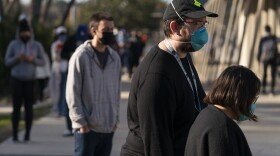
Pien Huang
Pien Huang is a health reporter on the Science desk. She was NPR's first Reflect America Fellow, working with shows, desks and podcasts to bring more diverse voices to air and online.
She's a former producer for WBUR/NPR's On Point and was a 2018 Environmental Reporting Fellow with The GroundTruth Project at WCAI in Cape Cod, covering the human impact on climate change. As a freelance audio and digital reporter, Huang's stories on the environment, arts and culture have been featured on NPR, the BBC and PRI's The World.
Huang's experiences span categories and continents. She was executive producer of Data Made to Matter, a podcast from the MIT Sloan School of Management, and was also an adjunct instructor in podcasting and audio journalism at Northeastern University. She worked as a project manager for public artist Ralph Helmick to help plan and execute The Founder's Memorial in Abu Dhabi and with Stoltze Design to tell visual stories through graphic design. Huang has traveled with scientists looking for signs of environmental change in Cameroon's frogs, in Panama's plants and in the ocean water off the ice edge of Antarctica. She has a degree in environmental science and public policy from Harvard.
-
Early fears of an escalating outbreak have not come to pass. Scientists are finding that the virus needs a very particular set of circumstances to spread effectively.
-
More than three months into the U.S. monkeypox outbreak, there's a welcome phrase coming from the lips of health officials who are steering the country's response: cautious optimism.
-
Pfizer has submitted data on its bivalent COVID-19 booster shot that specifically targets the latest omicron subvariants. If authorized, the company says the shots could be ready as soon as September.
-
Revised guidance from the Centers for Disease Control and Prevention looks to minimize COVID-19's disruption of daily life while conceding that the pandemic isn't over.
-
The Biden administration is allowing the shot to be given between layers of skin — a method that only requires a fifth of the full dose — in order to increase vaccinations and slow the outbreak.
-
The Biden administration will continue to require travelers to wear masks on planes and other forms of public transport,.
-
Those who contracted COVID-19 can end their isolation after five days while continuing to wear a well-fitting mask for an additional five days, according to the agency.
-
Cutting the isolation for positive cases to five days could lead to more infections if people don't take masking seriously. A testing requirement would have made the policy safer, experts say.
-
The investment is a response to an ongoing national shortage and follows a $2 billion investment in September to supply rapid tests to community health centers, food banks and schools.
-
If all goes to plan, Americans who got Pfizer or Moderna shots can get a third dose eight months after their last jab. Here's why health officials think you'll need one.










